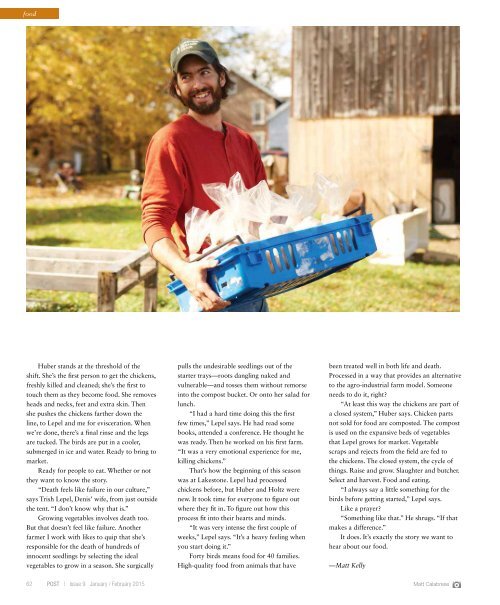You also want an ePaper? Increase the reach of your titles
YUMPU automatically turns print PDFs into web optimized ePapers that Google loves.
food<br />
Huber stands at the threshold of the<br />
shift. She’s the first person to get the chickens,<br />
freshly killed and cleaned; she’s the first to<br />
touch them as they become food. She removes<br />
heads and necks, feet and extra skin. Then<br />
she pushes the chickens farther down the<br />
line, to Lepel and me for evisceration. When<br />
we’re done, there’s a final rinse and the legs<br />
are tucked. The birds are put in a cooler,<br />
submerged in ice and water. Ready to bring to<br />
market.<br />
Ready for people to eat. Whether or not<br />
they want to know the story.<br />
“Death feels like failure in our culture,”<br />
says Trish Lepel, Denis’ wife, from just outside<br />
the tent. “I don’t know why that is.”<br />
Growing vegetables involves death too.<br />
But that doesn’t feel like failure. Another<br />
farmer I work with likes to quip that she’s<br />
responsible for the death of hundreds of<br />
innocent seedlings by selecting the ideal<br />
vegetables to grow in a season. She surgically<br />
pulls the undesirable seedlings out of the<br />
starter trays—roots dangling naked and<br />
vulnerable—and tosses them without remorse<br />
into the compost bucket. Or onto her salad for<br />
lunch.<br />
“I had a hard time doing this the first<br />
few times,” Lepel says. He had read some<br />
books, attended a conference. He thought he<br />
was ready. Then he worked on his first farm.<br />
“It was a very emotional experience for me,<br />
killing chickens.”<br />
That’s how the beginning of this season<br />
was at Lakestone. Lepel had processed<br />
chickens before, but Huber and Holtz were<br />
new. It took time for everyone to figure out<br />
where they fit in. To figure out how this<br />
process fit into their hearts and minds.<br />
“It was very intense the first couple of<br />
weeks,” Lepel says. “It’s a heavy feeling when<br />
you start doing it.”<br />
Forty birds means food for 40 families.<br />
High-quality food from animals that have<br />
been treated well in both life and death.<br />
Processed in a way that provides an alternative<br />
to the agro-industrial farm model. Someone<br />
needs to do it, right?<br />
“At least this way the chickens are part of<br />
a closed system,” Huber says. Chicken parts<br />
not sold for food are composted. The compost<br />
is used on the expansive beds of vegetables<br />
that Lepel grows for market. Vegetable<br />
scraps and rejects from the field are fed to<br />
the chickens. The closed system, the cycle of<br />
things. Raise and grow. Slaughter and butcher.<br />
Select and harvest. Food and eating.<br />
“I always say a little something for the<br />
birds before getting started,” Lepel says.<br />
Like a prayer?<br />
“Something like that.” He shrugs. “If that<br />
makes a difference.”<br />
It does. It’s exactly the story we want to<br />
hear about our food.<br />
—Matt Kelly<br />
62 <strong>POST</strong> | Issue 9 <strong>January</strong> / <strong>February</strong> <strong>2015</strong><br />
Matt Calabrese


